|
|
|
Sort Order |
|
|
|
Items / Page
|
|
|
|
|
|
|
| Srl | Item |
| 1 |
ID:
172106
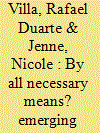

|
|
|
|
|
| Summary/Abstract |
Emerging powers from the global south have generally opposed the use of force in international politics. However, taking a closer look at the area of peacekeeping, the international community’s most institutionalized response to international insecurity, it is clear that the global south has been actively engaged in what has been described as peacekeeping’s coercive turn: the increasingly greater use of force. Building on the cases of Brazil and Indonesia, we argue that the peacekeeping policies of these emerging powers have been inconsistent with their declared reticence to use force. We explain the inconsistency by reference to knowledge imbalances between civilian and military actors, a gap in peacekeeping expertise and involvement in policy-making that allowed the armed forces to push the two countries into increasingly coercive peacekeeping. Moreover, civil–military knowledge imbalances prevented the emergence of alternative ideas more in line with Brazil’s and Indonesia’s traditional stance on the use of force.
|
|
|
|
|
|
|
|
|
|
|
|
|
|
|
|
| 2 |
ID:
171641
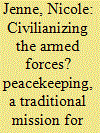

|
|
|
|
|
| Summary/Abstract |
Peacekeeping is widely believed to introduce a civilian element into military culture. However, empirical tests of whether peacekeeping actually yields civilianizing effects on the armed forces are few. Based on the case of Chile, I argue that participation in peacekeeping has failed to lead to fundamental changes in the military’s role perception vis-à-vis civilian actors, despite some practical learning experiences at the individual level. Peacekeeping has been assimilated into the existing warrior model, where civilian actors play only a secondary role.
|
|
|
|
|
|
|
|
|
|
|
|
|
|
|
|
| 3 |
ID:
178346
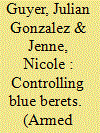

|
|
|
|
|
| Summary/Abstract |
Peacekeeping has widely been seen as conducive to submit the military to democratic rule. We put the assumption to an empirical test based on the case of Uruguay, today a fully democratic state that has consistently ranked among the world’s top peacekeeping contributors per capita. Specifically, we ask whether participation in peacekeeping has increased civilian control over the military. To answer this question, we focus on three aspects of democratic civil–military relations: civilian oversight, civilian policy management, and armed forces–society relations. We conclude that peacekeeping has done little to trigger greater involvement of civilians in the area of military and defense policy but that it contributed to reduce the gap between the armed forces and society. Nevertheless, due to political neglect by civilian authorities, the state of civil–military relations is one of subordinate military autonomy short of ideal, even if it does not represent a threat to democratic rule.
|
|
|
|
|
|
|
|
|
|
|
|
|
|
|
|
| 4 |
ID:
183893
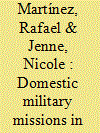

|
|
|
|
|
| Summary/Abstract |
Latin American militaries are today in many regards inoperative and obsolete as an instrument of defence. Yet, they seek to maintain their organisational power and privileges. Governments, on the other hand, lack the adequate means to fight criminality, persisting poverty and social inequality. In an apparent win-win situation, Latin American governments have used the military as a wildcard to step in where civilian state capacity falls short, including for urban and border patrols, literacy campaigns and to collect garbage, among many other tasks. The military's manifold internal use has been defended mainly based on pragmatic reasons. We argue instead that the ostensive pareto optimality between militaries and governments has had negative effects for civil-military relations from a democratic governance point of view that takes into consideration the efficiency and effectiveness of how the state delivers basic services across different policy areas.
|
|
|
|
|
|
|
|
|
|
|
|
|
|
|
|
| 5 |
ID:
177852
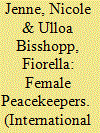

|
|
|
|
|
| Summary/Abstract |
In 2000, the United Nations Security Council Resolution 1325 on Women, Peace and Security recognized an urgent need to mainstream a gender perspective into peacekeeping operations in order to achieve gender equality. UN member states have been called upon to implement the Resolution through National Action Plans. Almost two decades after its adoption, research indicates that progress towards the goals set in Resolution 1325 has been slow. This article builds on the case of the Chilean military to assess whether and to what extent a gender perspective has been incorporated into the country’s peacekeeping practice. We argue that gender stereotypes have persisted despite Chile’s status as a regional pioneer in promoting gender equality in its defence policy. Paradoxically, the new opportunities peacekeeping offered for women in the military have been legitimized by a discourse that conforms to traditional gender stereotypes, such that women serve as the ‘peaceful and friendly face’ in peacekeeping.
|
|
|
|
|
|
|
|
|
|
|
|
|
|
|
|
| 6 |
ID:
189267
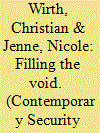

|
|
|
|
|
| Summary/Abstract |
Thirty years after the downfall of the Soviet-led communist bloc, the United States-led liberal international order is seen as coming to an end. Policymakers have converged on the need to safeguard the “rules-based order” across the newly coined “Indo-Pacific” region. However, policy and scholarly debates lack clarity about what exactly is to be preserved, and why the terms of the “rules-based order” and the “Indo-Pacific” have rapidly found their way into policy debates despite their contested meaning. Analyzing developments in regional multilateralism, we find that mainstream discourses purport static conceptions of order, which are often conflated with United States-centered trans-Pacific alliance relationships. The ensuing problem of order stems in large part from the fact that multilateral projects for building alternate orders, undertaken since the early 1990s, have remained far below their potential. We conclude that emerging forms of multilateral cooperation across the enlarged “Indo-Pacific” region have partially filled this void.
|
|
|
|
|
|
|
|
|
|
|
|
|
|
|
|
| 7 |
ID:
195754


|
|
|
|
|
| Summary/Abstract |
The United Nations Stabilization Mission in Haiti (MINUSTAH, 2004–2017) was an unprecedented effort of Latin American peacekeeping. Nine countries contributed the majority of troops to the mission in which regional governments sought to handle a security crisis in their neighbourhood rather than leaving the lead to western countries. However, when the mission came to an end after thirteen years, peacekeeping faded from the regional and national security agendas, with the exception of Uruguay. How and why did MINUSTAH impact the region's current hesitation to engage in peace operations? To answer this question, the article draws on assemblage theory and uses data from policy documents, academic literature and previous research on peacekeeping in Latin America. I argue that contrary to what Latin America's current, limited peacekeeping engagement suggests, MINUSTAH produced significant changes in the region's political landscape. While these could have paved the way to greater involvement in peace operations, however, parallel developments shaped Latin American security policies and military planning at the expense of the region's future participation in UN peacekeeping. The article adds to existing scholarship by probing the conditions that drive the temporality of assemblages and provides a new perspective on Latin American peacekeeping.
|
|
|
|
|
|
|
|
|
|
|
|
|
|
|
|
| 8 |
ID:
194778


|
|
|
|
|
| Summary/Abstract |
This article is concerned with narratives about the relation between the military and civilians. Narratives, dominant institutionalized discourses, influence how individuals learn by providing frames of reference which moderate the acquisition of new knowledge. Although the importance of narratives for institutional behavior has been recognized in the field of security studies, little attention has been paid to how they influence learning. This article presents a framework to analyze narratives in the context of learning based on the case of peace operations. Using qualitative case studies for theory-building, I argue that narratives on the closeness between the military and “the people” ease pressures to improve the military’s engagement with civilians and render peacekeepers less inclined to learn. All else equal, the absence of entrenched ideas about military–society relations facilitates the acquisition of new knowledge and skills in civil–military cooperation.
|
|
|
|
|
|
|
|
|
|
|
|
|
|
|
|
| 9 |
ID:
157531
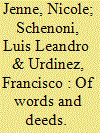

|
|
|
|
|
| Summary/Abstract |
The idea of an integrated Latin American region goes back to the early post-independence period, and yet, in substance, Latin American regionalism has remained far behind its stated aims. The perceived implementation gap has raised the question why policymakers continued to talk about something they appeared to avoid in practice. This article contributes to the debate on Latin America’s integration gap by exploring the phenomenon of declaratory regionalism - the practice of referring to the region and its institutions in political speeches. Based on quantitative text analysis of the speeches presidents delivered annually at the UN’s General Assembly between 1994 and 2014, we show that this practice has not been uniform. Presidents distinguish between different forms of regionalism, integration and cooperation, and frame the geographical region they refer to accordingly. In motivating presidents to speak about integration as opposed to cooperation, ideology and democratic performance stand out as crucial factors.
|
|
|
|
|
|
|
|
|
|
|
|
|
|
|
|
| 10 |
ID:
183890
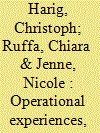

|
|
|
|
|
| Summary/Abstract |
A considerable amount of research within security studies has explored the military's increasingly diverse and multifaceted tasks. However, this debate has been disconnected from the literature on civil-military relations to the effect that we still lack knowledge about how and why these operational tasks have consequences for the relations between the armed forces, civilian authorities, and society at large. In order to provide for a better understanding of these effects, this introduction to the Special Issue debates the concept of operational experiences to capture how the military's routine activities affect the equilibria, logics, and mechanisms of civil-military relations. The article then provides an overview of the Special Issue's six contributions, whose diverse and global perspectives shed light on different aspects of the relationship between military missions and the military's roles in society and politics. Among other factors, they highlight role conceptions – the military's shared views on the purpose of the institution – as crucial in shaping the dynamic relation between what the military does and what place it occupies within the state and society. The article concludes by describing potentially fruitful areas of future research.
|
|
|
|
|
|
|
|
|
|
|
|
|
|
|
|
| 11 |
ID:
165115
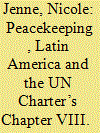

|
|
|
|
|
| Summary/Abstract |
Authorities at the United Nations have repeatedly called on regional organizations to step up their commitment in the area of peacekeeping. These calls are based on Chapter VIII of the UN Charter, which gives regional organizations a role in international peace and security. While organizations in Europe and Africa have created regional peacekeeping arrangements, such have failed to emerge in Latin America. This is puzzling, for different reasons. On the one hand, several countries have recently sought to increase their peacekeeping profile. States have strong incentives to pool their resources, especially if they face budgetary constraints such as the developing countries of Latin America. On the other hand, peacekeeping might provide an answer to some of the security problems the region faces. This article provides an evaluation of how Latin America has responded to the global demand to develop regional peacekeeping capacities. I argue that cooperation in peacekeeping has mainly been the result of foreign policy considerations rather than a concern for peacekeeping per se. In light of past experiences of shallow institutionalization, the article concludes with a reflection on the future prospects for a Latin American peacekeeping framework.
|
|
|
|
|
|
|
|
|
|
|
|
|
|
|
|
| 12 |
ID:
175556
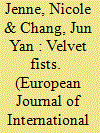

|
|
|
|
|
| Summary/Abstract |
Defence diplomacy represents a notable paradox. On the one hand, it is a cooperative activity to build strategic and moralistic trust between states and thus positively shape the environment in which foreign policy is made. On the other hand, defence diplomacy also involves competition and demonstrations of military power, which may contravene its goal of building moralistic trust and undermine confidence between states. This article deals with the latter competitive realpolitik elements of defence diplomacy in terms of secrecy, swaggering, and shows of force that have largely been ignored in the literature. Building on a theoretical discussion of whether defence diplomacy works, the case of peacekeeping in Southeast Asia is analysed to illustrate how defence diplomatic activities produce effects contrary to their stated aims.
|
|
|
|
|
|
|
|
|
|
|
|
|
|
|
|
| 13 |
ID:
145768
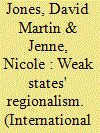

|
|
|
|
|
| Summary/Abstract |
Since the Association of Southeast Asian Nations (ASEAN) expanded its institutional outreach to span the broader Asia Pacific and new policy areas, a dominant orthodoxy has placed the organization at the center of the region's international order. More recently, uncertainty in the context of China's rise sheds doubt on ASEAN's apparent centrality to its procedurally driven transformation of foreign relations across East Asia. While theories of cooperation explain why and when minor powers choose to pool their resources, the reverse logic has hardly been considered. This paper shows that the particular type of ASEAN regionalism is not only a product of weak states' cooperation but that the lack of capacity also sets the limits for the regional project. Two case studies on intramural security elicit the limited effectiveness of ASEAN's endeavor to develop into a security community. Meanwhile, as an examination of the South China Sea dispute demonstrates, its attempt to export its norms has rendered it vulnerable to the intervention of more powerful actors and increasingly side-lined by the evolution of great power rivalry.
|
|
|
|
|
|
|
|
|
|
|
|
|
|
|
|
| 14 |
ID:
161326
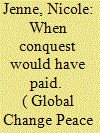

|
|
|
|
|
| Summary/Abstract |
In recent decades, a lack of state capacity has been seen as a major threat to international security. This article disagrees by making a simple claim: states that lack the capacity to go to war compromise to avoid it. I develop the argument using insights from the discipline of International Relations and military studies and probe its plausibility with a single case study, the Thai-Cambodian border conflict during 2008–2011. Based on data from field research in the two countries, I use Peter Liberman's framework to argue that this is a case when conquest would have paid for Thailand. Yet, a lack of domestic capacity created trade-offs, fear of instability and reduced confidence in a military strategy, which together explain why large-scale armed conflict was avoided by both sides. The findings have potential implications for how we think about international security today.
|
|
|
|
|
|
|
|
|
|
|
|
|
|
|
|
| 15 |
ID:
190887
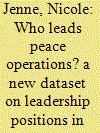

|
|
|
|
|
| Summary/Abstract |
It is widely recognized that UN peace operations have been critically influenced by their leadership personnel in the field since the first UN peacekeepers were deployed in 1948. But who exactly are the people that lead peace operations and decide how these are implemented on the ground? This special data feature introduces a new dataset on leadership positions in UN peace operations from its interception in 1948 up to 2019. The relevance of different authorities in peace operations is discussed, followed by an examination of general trends in the data with regards to the duration of term in different leadership positions, the national and regional origin of peace operations authorities, and the distribution of gender. It is shown that scholars studying a variety of topics, including policymaking at the UN, the use of force in peace operations, international responsibilities, and the role of the global south in international politics, can benefit from paying closer attention to the question of who occupies leadership positions in UN peace operations.
|
|
|
|
|
|
|
|
|
|
|
|
|
|
|
|
| 16 |
ID:
187031
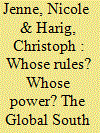

|
|
|
|
|
| Summary/Abstract |
International organisations reflect global power configurations and as such, are deemed to reproduce global inequalities. Nevertheless, they also represent opportunities for the Global South to challenge the global stratification of power, for instance by providing personnel to international agencies and bureaucracies. This article examines the role of leadership personnel from the Global South in implementing robust peacekeeping mandates.
Given that states from the Global South have often been hesitant to support the use of force internationally, can leadership positions in peace operations help these states to influence norms at the implementation level? We develop a conceptual understanding of individuals’ role in implementing norms and apply the framework to military force commanders from Brazil, India, and Rwanda. The analysis demonstrates that appointments provide an opportunity for norm contestation, but do not necessarily guarantee such influence. Under certain circumstances, we find that military force commanders can actually undermine their governments’ preferences. However, the relation between force commanders’ practices and their country of origin's policy stance is complex and influenced by a variety of different factors that merit further investigation.
|
|
|
|
|
|
|
|
|
|
|
|
|
|
|
|
|
|
|
|
|